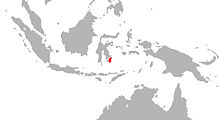The Muna-Buton macaque (Macaca ochreata brunnescens) is one of seven Sulawesi macaques in Indonesia. It is only found on two small islands off the south-east coast: the islands of Buton and Muna. This Old World monkey is diurnal and arboreal, although it can spend significant amounts of time on the ground. It is black with grey "boots" and a brownish colour to the fur on its back. Like other Sulawesi macaques, it has a reduced tail of only about 35mm in length. Its body is about 475 - 495mm in length.[2]
| Muna-Buton macaque | |
|---|---|
| Scientific classification | |
| Domain: | Eukaryota |
| Kingdom: | Animalia |
| Phylum: | Chordata |
| Class: | Mammalia |
| Order: | Primates |
| Suborder: | Haplorhini |
| Infraorder: | Simiiformes |
| Family: | Cercopithecidae |
| Genus: | Macaca |
| Species: | |
| Subspecies: | M. o. brunnescens
|
| Trinomial name | |
| Macaca ochreata brunnescens (Matschie, 1901)
| |

| |
The Muna-Buton macaque feeds on fruits for over 60% of its diet, including figs and pandanus fruits. It also feeds on leaves, insects, flowers, and bark. It is a very successful crop-raider, and if there are agricultural fields nearby, it will spend up to 2 hours at a time raiding farmers crops, such as sweet potato, maize, papaya, and banana.[2]
References
edit- ^ Lee, R.; Riley, E.; Sangermano, F.; Cannon, C.; Shekelle, M (2021). "Macaca brunnescens". IUCN Red List of Threatened Species. 2021: e.T12569A17985924. doi:10.2305/IUCN.UK.2021-1.RLTS.T12569A17985924.en. Retrieved 12 November 2021.
- ^ a b Priston, N E C (2005). "Crop-Raiding by Macaca Ochreata Brunnescens in Sulawesi: Reality, Perceptions and Outcomes for Conservation". PhD thesis, University of Cambridge.
